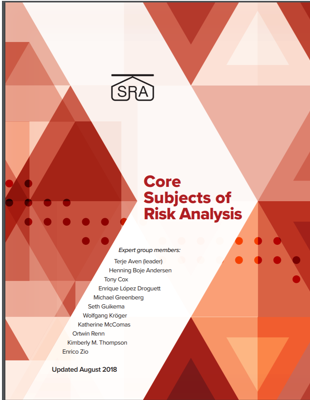
Core Subjects of Risk Analysis

The Core Subjects of Risk Analysis covers five main topics including fundamentals, risk assessment, risk perception and communication, risk management and governance, and solving real risk problems and issues. This document provides guidance on the subjects to be covered in risk analysis programs and offers a platform to identify specific risk analysis subjects for broad overview courses on risk analysis, as well as for courses and programs on related areas such as safety and security.
Risk analysis as a field is built on two main knowledge generating pillars:
A. Risk knowledge related to an activity in the real world
B. Knowledge on concepts, theories, frameworks, approaches, principles, methods and models to understand, assess, characterize, communicate, manage and govern risk.
Core Subjects of Risk Analysis provides guidance on the subjects to be covered in risk analysis programs and offers a platform to identify specific risk analysis subjects for broad overview courses on risk analysis, as well as for courses and programs on related areas, such as safety.
The document covers five topics including:
- Risk analysis fundamentals,
- Risk assessment,
- Risk perception and communication,
- Risk management and governance, and,
- Solving real risk problems and issues.
The subjects and topics covered here are not all “owned” by the risk analysis field per se, however, risk analysis concepts and methodologies are applied to help make informed decisions and to see patterns and models in data that help interpret randomness and uncertainty in order to draw conclusions about the topic or issue being studied.
As the field and science of risk analysis is developing, it must balance between the need for authoritative guidance and solutions on the one hand, and the need for continuous debate, research and improvement on the other. This balance is sought by specifying the subjects up to some level of detail but avoiding selecting and forcing a specific implementation or solution.
Check out these webinars for more information on core subjects!
CHALLENGES FOR PUBLIC DISCOURSE AND POLICY MAKING
APPLIED RISK MANAGEMENT: A COMPANY PERSPECTIVE